Intensive Modern Standard Arabic (1-13 Weeks): If you’re interested in learning Modern Standard Arabic (Fusha), our Intensive Arabic Language Program in the West Bank, Palestine, is the perfect fit for you, regardless of your motivation. Study in Palestine offers super-intensive, intensive, and non-intensive immersion Arabic programs in Modern Standard Arabic, as well as dialects such as Palestinian colloquial Arabic, a dialect of Levantine Arabic.
Whether you’re an undergraduate, graduate, professional, or retiree, our intensive Modern Standard Arabic language programs cater to your needs. Located in the city of Hebron, in the West Bank, our Arabic language programs welcome all levels of learners, from first-time learners and beginners to intermediate and advanced learners. If you’re currently enrolled in a college or university, you may also earn academic credit toward your studies by participating in our intensive Arabic immersion program.
Table of Contents
Modern Standard Arabic (MSA) Courses for 2025-2026
Engage in Palestine is pleased to announce the availability of flexible and personalized Modern Standard Arabic (MSA) courses, including summer programs, winter Arabic lessons, and online classes, for the 2025-2026 academic year.
Our courses for 2025/2026 are delivered through tailored one-on-one online sessions, small group lessons, or private in-person classes, ensuring a comprehensive and immersive learning experience. MSA, the formal standardized Arabic used across the Arab world, provides an essential foundation for mastering the language and serves as a stepping stone to understanding various regional dialects.
Arabic Classes Span from One Week to Three Months
We offer intensive Arabic language programs for one week to three months year-round (spring, summer, fall, and winter). You choose the dates and your study level to match your needs and preferences!
Our busiest time is summer, when we see the highest number of international students and volunteers. During this period, we offer intensive Arabic courses that differ from our regular curriculum, running from late June to late September.
This new four-week Modern Arabic Intensive Program comprises 4-6 hours of lessons per day, 5 days a week, for a total of 80 lesson hours per month – ample opportunity for students to immerse themselves in Arabic language and culture for up to three months in summer! Our intensive summer courses, much like our other courses, cater to your own needs, whether language ability, learning preferences, or timings!
All of our Modern Standard Arabic Immersion courses are taught in small groups, capped at 5 students at a maximum. This allows our students to interact closely with their classmates and our well-qualified teachers, allowing them to use their language skills both inside and outside of the classroom.
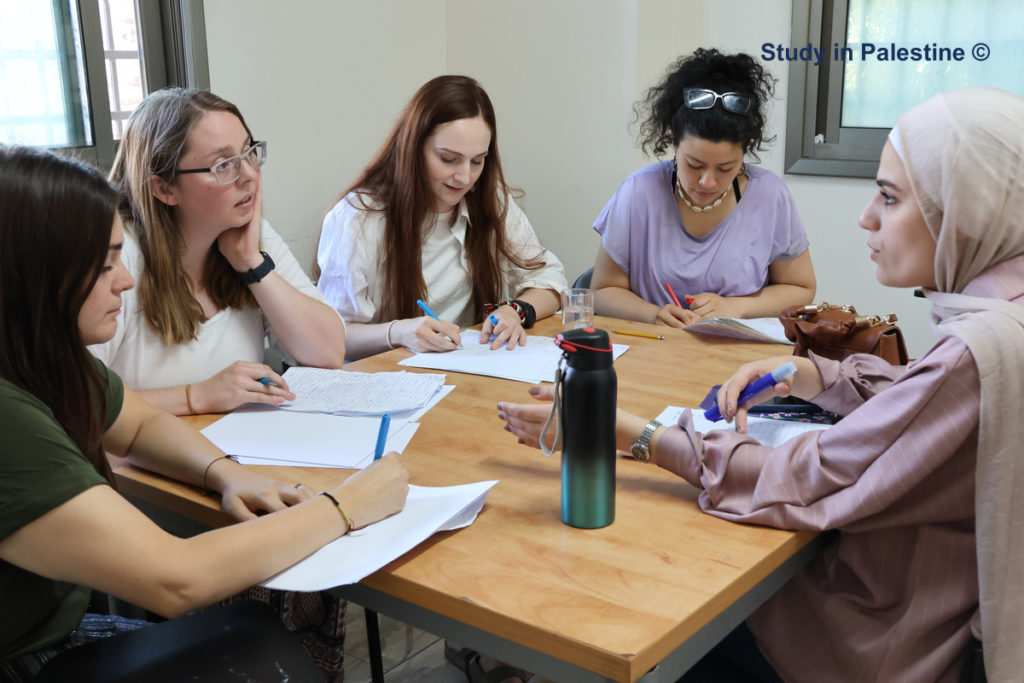
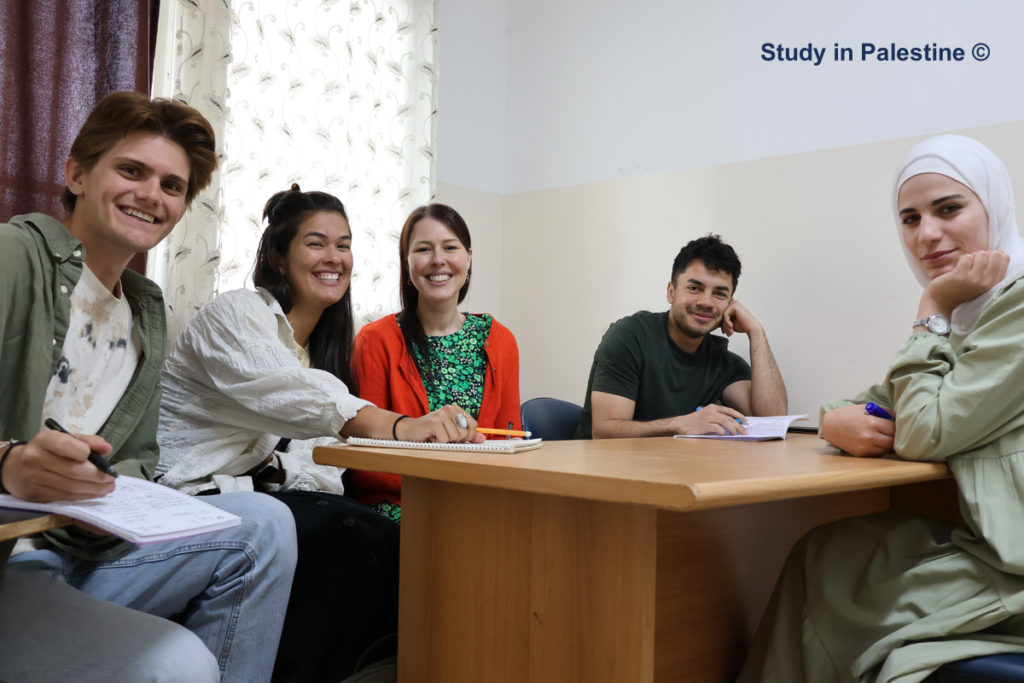
What Are the Courses Like?
Study in Palestine offers Modern Standard Arabic (MSA) courses at six different difficulty levels: Beginner, Elementary 1 or 2, Intermediate 1 or 2, and Advanced. Each Arabic course level is available in either an intensive, super-intensive, or non-intensive format, with variations in the number of instructional hours per week and the level of immersion in Arabic culture.
Our Arabic courses are available year-round and have no official application deadlines, so you can start or continue your MSA journey at any time that suits you.
Classical or Modern Standard Arabic?
Modern Standard Arabic and classical Arabic are often confused. Classical Arabic, or Quranic Arabic, dates back to the 7th century when Islam was founded. Modern Standard Arabic is based on this classical style, with slight differences in stylization and diction.
Classical and Modern Standard Arabic are often viewed as synonymous, with the term Fus’ha encompassing both. Enrolling in the MSA Program helps students grasp higher literary forms of Arabic, including the Qur’an.
How Will Courses Be Conducted?
Students in Study in Palestine’s intensive Modern Standard Arabic Program will gain a strong understanding of Arabic through an immersive experience that introduces them to Arab culture and customs. They will also have ample opportunities to practice with native speakers.
Our Modern Standard Arabic courses are offered in two options: private, one-on-one Arabic lessons for an extra personalized approach to learning, and our group settings, typically two or three students, which allow for structured interaction between peers at similar levels—often an effective strategy for fostering collective linguistic growth.
All of our students are able to enjoy practicing their Arabic together and collaborate on group projects, class excursions, and more!
All our intensive Arabic courses are geared towards English speakers, although the more advanced the Arabic level, the less English will be used in lessons.
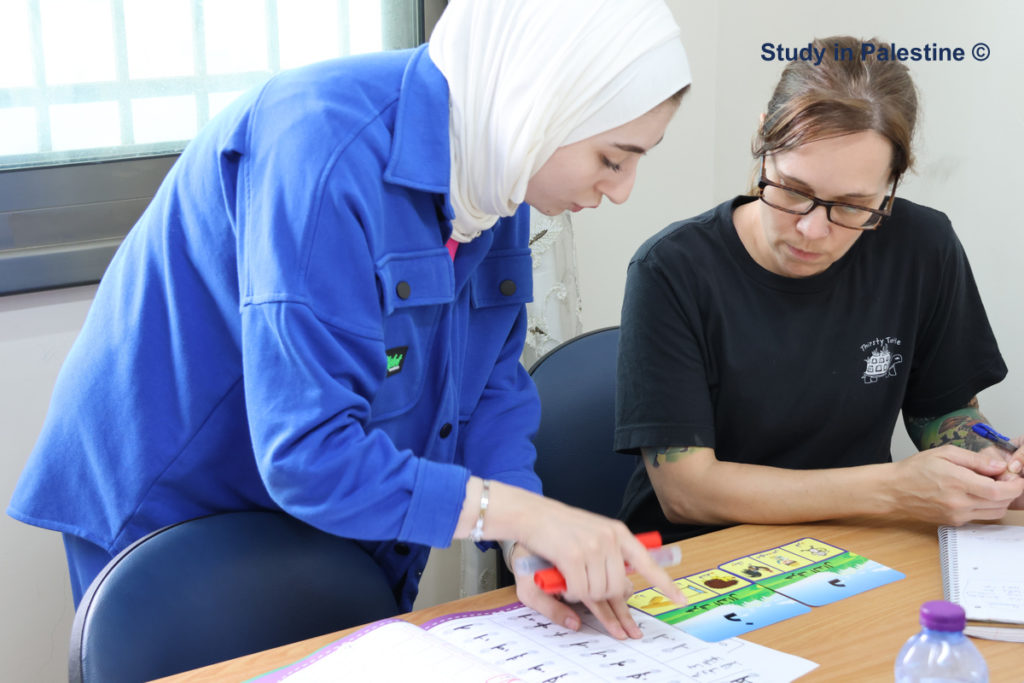
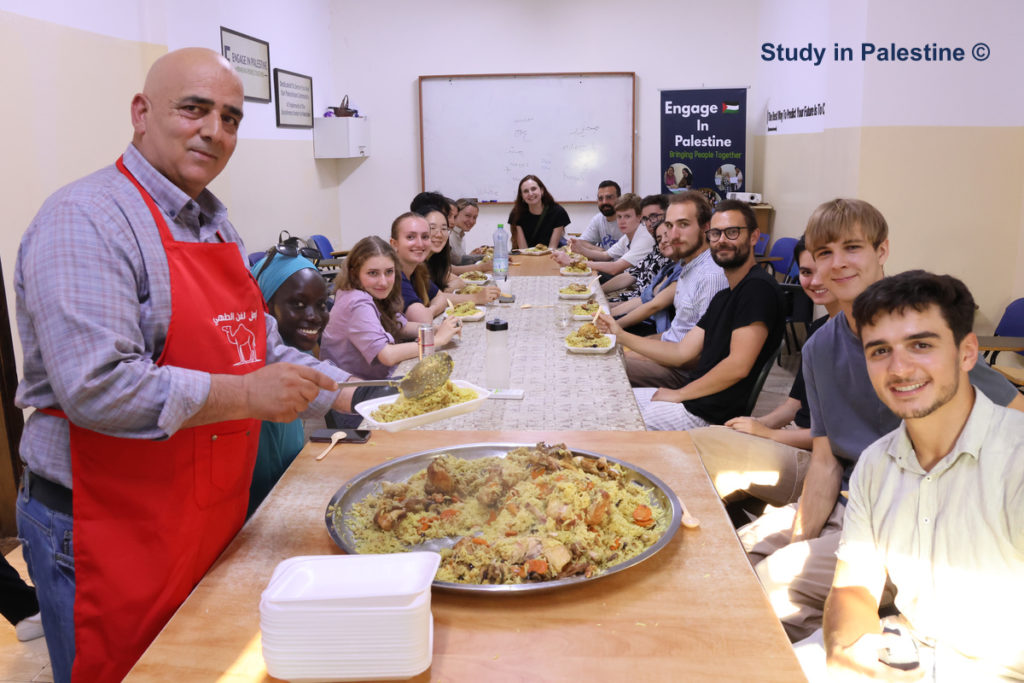
Why Study Modern Standard Arabic?
Modern Standard Arabic (MSA) is ideal for those who want a solid understanding of Arabic and plan to explore later colloquial variants. MSA is widely used and is the main form of Arabic taught in schools across the Middle East and North Africa (MENA) region.
MSA’s broad geographical reach makes it ideal for exploring the Arabic language. It plays a key role in literature, media, academia, diplomacy, and business. Studying MSA grants access to the Arabic literary and official realms, paving the way for professional opportunities.
Why Study in Palestine?
Study in Palestine offers an immersive experience in Hebron, where students can enhance their Arabic skills in daily life. They can choose to stay with a Palestinian host family or in a shared male dorm. With limited English spoken, students have plenty of opportunities to practice Arabic, supported by the friendly local community.
Hebron in the West Bank is a great base for exploring Palestine. Students can connect with Arabic peers at the Center and often travel together on weekends. Study in Palestine also organizes trips to cultural sites and refugee camps, providing insights into the region’s complexity and beauty.
Qualified Teachers
At Study in Palestine, we take pride in our team of faculty and staff, who are all native Arabic speakers. Many of our staff hold degrees in related fields, such as Teaching Arabic to Non-native Speakers, Teaching Arabic as a Second Language, Arabic cultural studies, Arabic Literary Studies, and more.
This diverse educational background ensures that our students receive top-notch instruction from experienced professionals who are passionate about teaching Arabic to learners from all over the world.
Reside with a Palestinian Host Family
Studying in Palestine offers a unique advantage: our students can reside with a Palestinian host family. Female students are guaranteed this opportunity, but due to the conservative nature of Hebron, it is subject to availability for male students.
The experience is truly special. It provides our students not only with a chance to practice their Arabic skills with native speakers around the clock but also with a chance to gain insight into Palestinian culture, customs, and way of life from within the home.
Arabic Course Levels on Offer
At Study in Palestine in Palestine, we provide a comprehensive, intensive Modern Standard Arabic course catering to students of all levels, from beginners to advanced learners. Our course is designed to equip students with the essential skills needed to read, write, speak, and listen to Arabic effectively. We offer a variety of Arabic courses and levels, including:
| Modern Standard Arabic Intensive Program | Summer Modern Standard Arabic |
| Beginners Course in Modern Standard Arabic | Online Modern Standard Arabic |
Beginner Modern Standard Arabic Course
- Designed for students with absolutely no experience.
- Introduces students to basic concepts, the alphabet, and common vocabulary and phrases.
Elementary Level 1 Modern Standard Arabic Course
- Continues on the previous course
- Introductory topics: shopping, directions, preferences
Elementary Level 2 Modern Standard Arabic Course
- More complex grammar
- More diverse vocabulary
Intermediate Level 1 Modern Standard Arabic Course
- Ventures into Hebron to communicate with native speakers and complete everyday tasks
- Culture, art, politics, and more specific issues.
Intermediate Level 2 Modern Standard Arabic Course
- For those with an extensive Arabic vocabulary
- Practical application of Arabic – ventures into Hebron, etc.
Advanced Modern Standard Arabic Course
- Combination of all previous curricula
- Complex reading, writing, and spoken materials
What’s the Difference Between Course Intensities?
Please note that course intensities refer to the frequency of classes, number of classes, amount of assigned homework, and level of immersion, which differ from course levels. Please find below the Arabic Course intensities available at Study in Palestine in Palestine:
1. Non-Intensive Modern Standard Arabic Course
If you are interested in a long-term intensive MSA program of 1-3 months, we recommend students enroll in a non-intensive course. This will provide plenty of in-class instruction(4 lesson hours* per day, 3 days a week) while still leaving ample time to explore the city of Hebron and immerse yourself in Palestinian culture.
2. Intensive Modern Standard Arabic Course
The intensive Modern Standard Arabic course is designed to further immerse students in the Arabic language and culture. These courses are held five days a week for approximately four lesson hours* each day, giving a total of about 20 lesson hours* of instruction per week. Intensive Arabic courses also include additional homework and out-of-classroom assignments for participants.
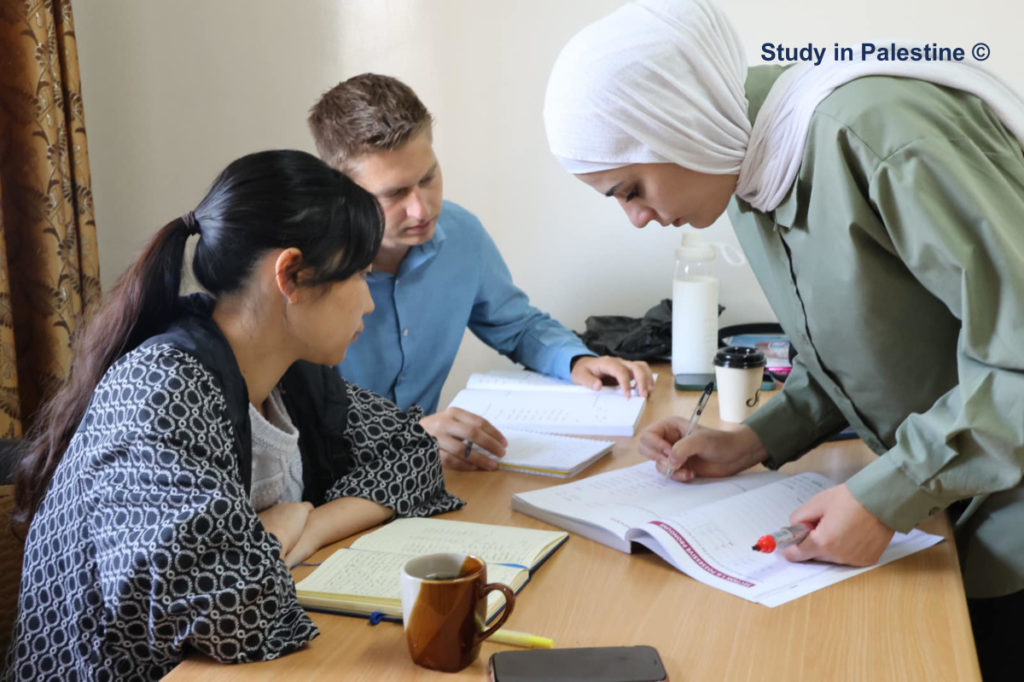
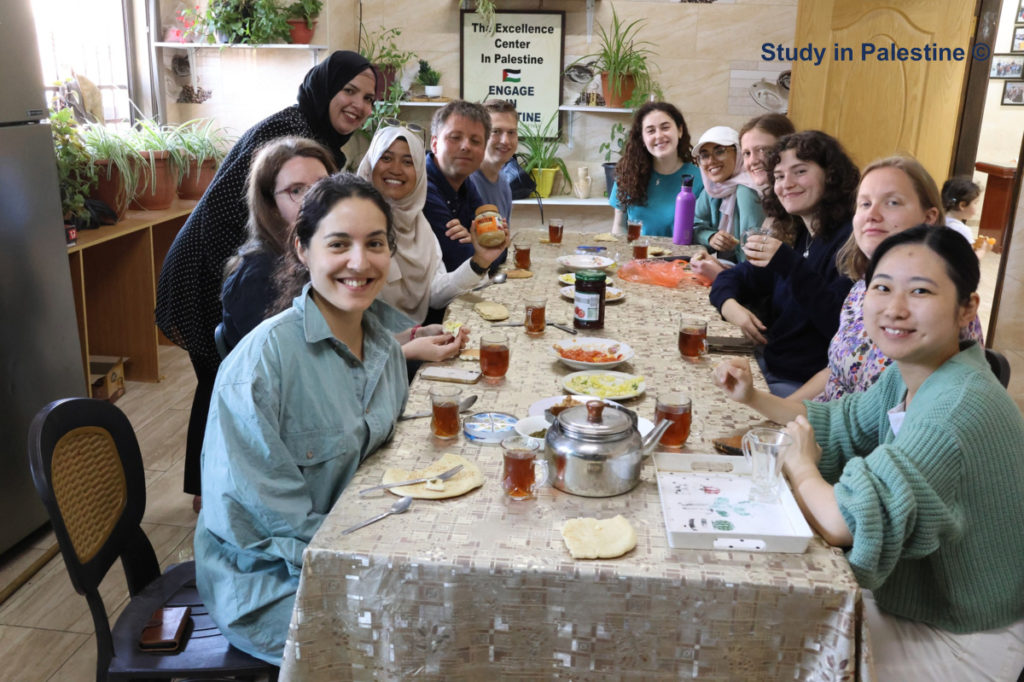
3. Super-Intensive Modern Standard Arabic Course
Finally, our super-intensive courses are designed for students who are looking for an accelerated Arabic course in a completely immersive, high-intensity classroom setting. Super-intensive Arabic courses are conducted 5 days a week at 6 lesson hours* of instruction per day, totaling approximately 30 lesson hours* per week. We recommend those studying for less than a month enroll in this program.
* Please note that 1 lesson hour = 45 minutes.
Which Course Is for Me?
Study in Palestine provides a complimentary placement test if you’re unsure which Arabic course to enroll in. This test assesses your skills in four crucial areas of the Arabic language: speaking, reading, writing, and listening.
We’re always available to provide guidance and answer any questions you may have about course levels or intensity. Our contact information and links to our Facebook page and other social media platforms are at the bottom of this page.
General Information Regarding Modern Standard Arabic Courses
| Modern Standard Arabic Courses | Super-Intensive Program | Intensive Program | Non-Intensive Program |
| Program Duration | 1-13 weeks | 1-13 weeks | 1-13 weeks |
| Lessons Per Week | 30 | 20 | 12 |
| Days Per Week | 5 | 5 | 3 |
| Lesson Duration | 45 minutes | 45 minutes | 45 minutes |
| Average Class Size | 1-3 students | 1-3 students | 1-3 students |
| Maximum Class Size | 3 students | 3 students | 3 students |
| Program Levels | Beginner Elementary 1 Elementary 2 Intermediate 1 Intermediate 2 Advanced | Beginner Elementary 1 Elementary 2 Intermediate 1 Intermediate 2 Advanced | Beginner Elementary 1 Elementary 2 Intermediate 1 Intermediate 2 Advanced |
| Lesson Periods | Morning 8:30-12:30 Afternoon 12:30-16:00 | Morning 8:30-12:30 Afternoon 12:30-16:00 | Morning 8:30-12:30 Afternoon 12:30-16:00 |
| Application Deadline | No Deadline | No Deadline | No Deadline |
| Start/End Dates | Flexible | Flexible | Flexible |
| Program Fee Per Week | 700€ Confirm Prices Here | 500€ Confirm Prices Here | 370€ Confirm Prices Here |
| University Credit | Available | Available | Available |
Additional Pertinent Information
- 30€ one-time registration fee
- No extra charge for study materials, including books
- Free placement test
- Certificate of completion
- The monthly program fee covers:
- Arabic courses
- Breakfast
- Housing
- Center-led excursions in Hebron
- Operational costs
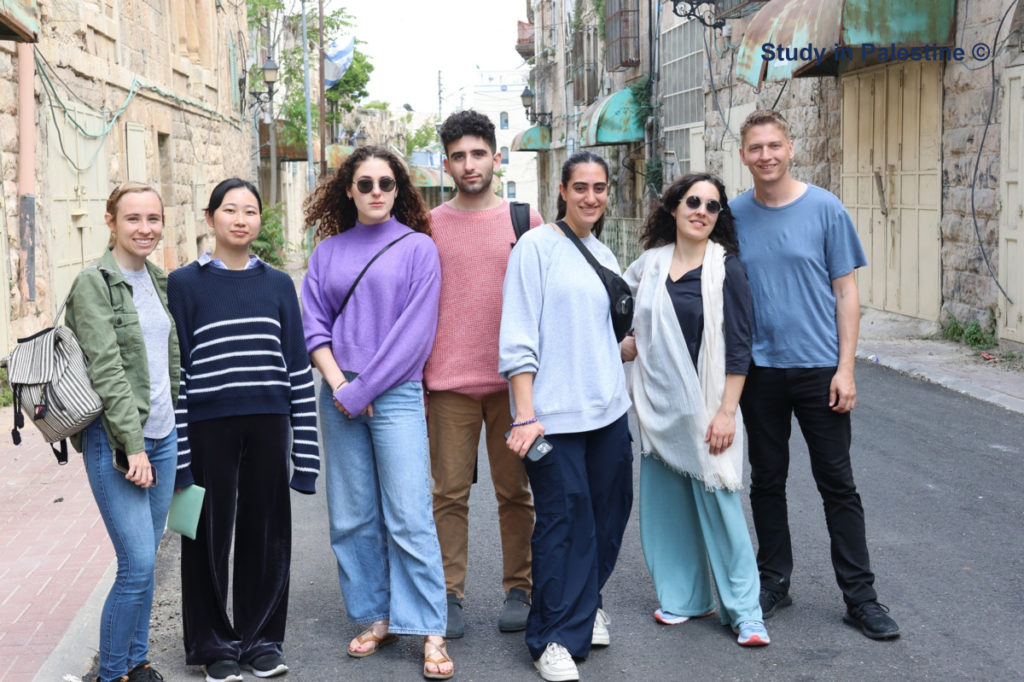
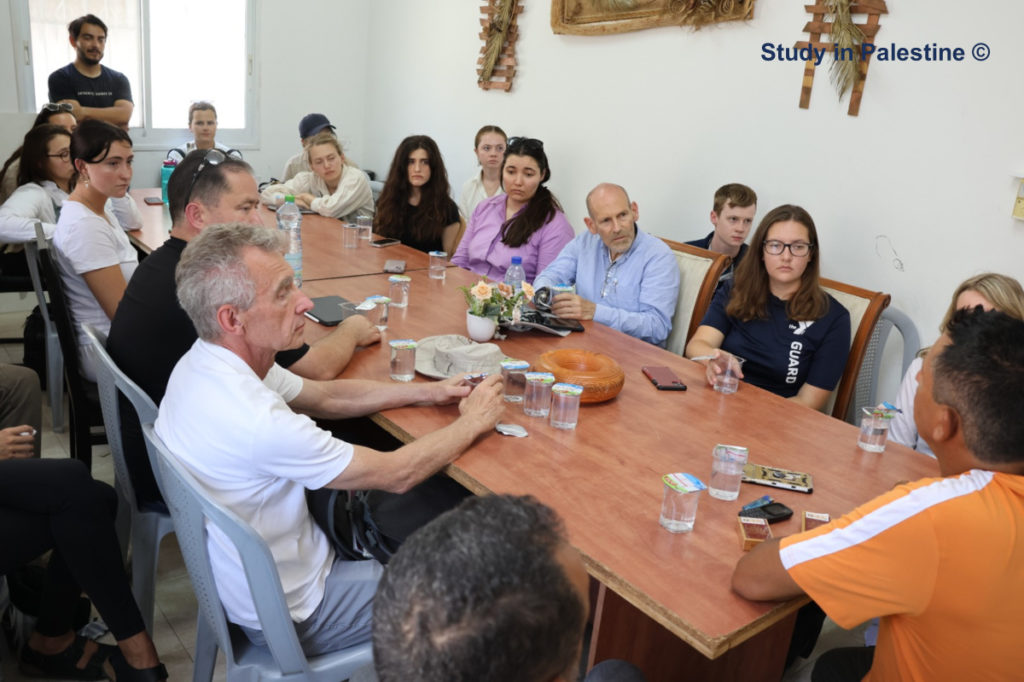
A Typical Day at Study in Palestine
Your schedule will vary depending on the intensity of your Arabic course. Intensive and super-intensive courses run five days per week, with two days off. Non-intensive courses have classes three days per week, with four days off.
You will begin your day with an Arabic lesson at 8:30 a.m. (or 12:30 p.m. for intensive and non-intensive courses). At 10 a.m., you will have a break for breakfast at the Center, allowing you to try traditional Palestinian food and socialize with others.
After breakfast, you will resume your Arabic lessons at 10:30 am and finish by 12:30 pm. Super-intensive courses have additional lessons in the afternoon. During your lessons, you can take short breaks.
You can make your own arrangements for lunch. Study in Palestine organizes sightseeing trips in Hebron, which may affect the time of your Arabic lessons.
Afternoons and evenings are free, with occasional optional activities to showcase Palestine’s culture.
Free Time and Weekend Exploration
Traveling in the Palestine and Israel region is a big draw for our students. Our intensive Arabic immersion courses provide ample free time to explore these exciting destinations. Located in the heart of Hebron, a beautiful and historic city, our programs offer access to numerous shops, cafes, and attractions.
Most Arabic students have two full days off each week (Friday and usually Saturday), while those in the non-intensive course have four days off. Many students use this time to explore other cities with fellow students or international volunteers.
This includes, but is not limited to, Palestinian cities such as Bethlehem, Jerusalem, Ramallah, Jericho (and the Dead Sea), Nablus, Tel Aviv, Jaffa, Haifa, and many more. Traveling around Palestine is easy and affordable. You will be surprised by how quickly your schedule will fill up and how quickly your time will fly!
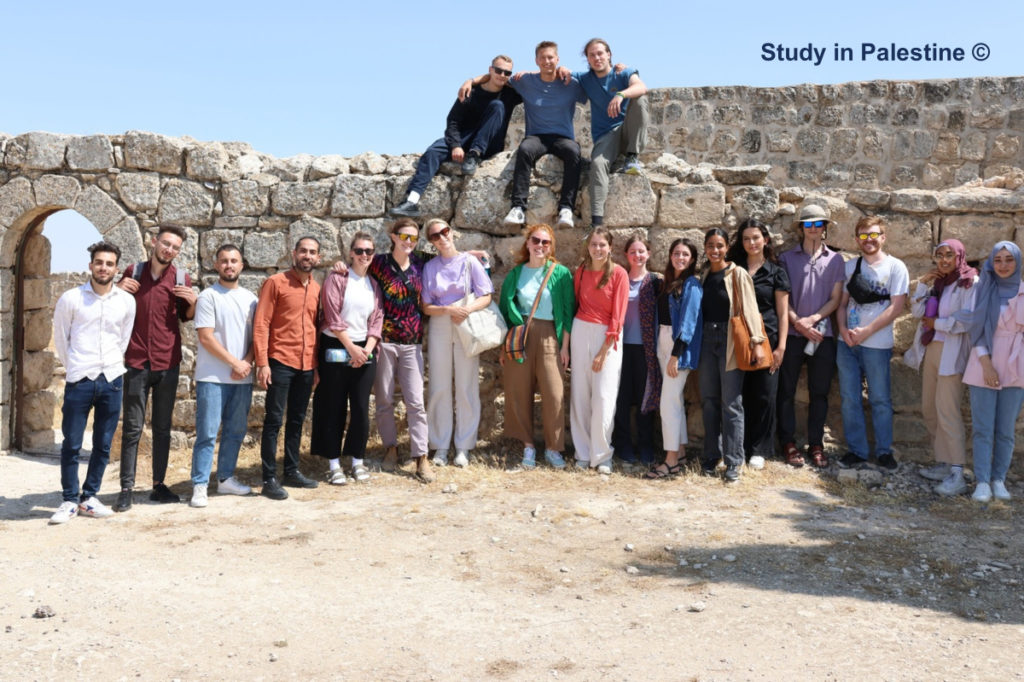
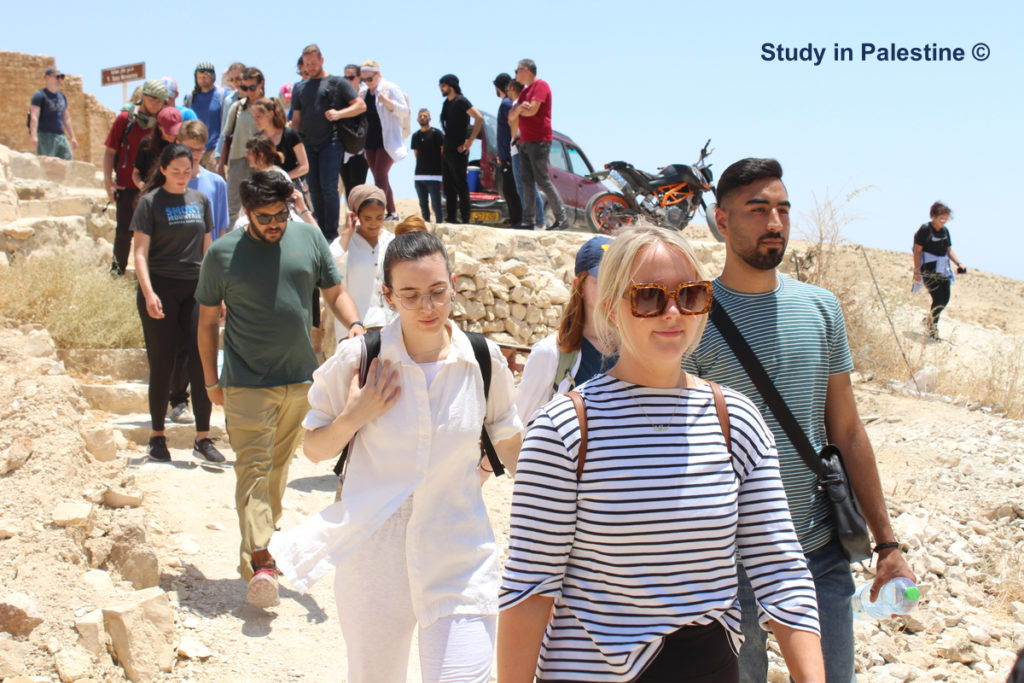
Safety of Our International Students in Palestine
The region of Palestine has not been stable for the last few decades. There is always unrest and war, sometimes more volatile and at other times calmer. Nonetheless, millions of tourists visit Palestine and the West Bank, including Hebron, Ramallah, Bethlehem, Jenin, Tulkarem, Nablus, and many other cities, without any safety issues each year. Palestinians, in general, are welcoming and hospitable people. They recognize that the politics of a country and its people may differ.
Since its formation in 2011, Study in Palestine has welcomed over 1,000 international visitors. These visitors lived and worked or studied in Hebron for a few weeks or months. Overall, they faced no threat or were unsafe in Hebron or the West Bank.
Moreover, Study in Palestine is situated in an area of Hebron under the Palestinian authority, in the heart of the city. Our Palestinian host families and the male dorms are also located near Study in Palestine.
Awards and Recognition
Study in Palestine has proudly earned several Community Awards, including recognition as the Best Arabic Language School overseas, one of the best Online Programs for Palestinian Colloquial Arabic Providers, and the Top Provider of Volunteer and Internship Opportunities abroad for the years 2019, 2021, 2022, 2023, and 2024. For further details, please visit our profiles on GoOverseas.com and GoAbroad.com.
- Check out our latest awards here
- +900 Reviews (96.8%) on Gooverseas.com
- +190 Reviews (9.3/10) on Goabroad.com
- Participants’ video testimonials
How Do I Get a Visa to Visit Palestine?
- Most of our international participants get a three-month tourist visa when they fly to Israeli airports or cross from Jordan to the West Bank.
- Generally, no prior visa is needed for Americans, Canadians, and most Europeans to enter Palestine, but please refer to the visa exemption agreement for further information. Upon your arrival at the Israeli Airports, you will be granted a tourist visa that is valid for 90 days. This is sufficient for participation in Study in Palestine’s programs and enables you to travel around Palestine and Israel easily.
Traveling to and from Hebron, West Bank
All of the Study in Palestine volunteers travel to and from Hebron using private or shared taxis that pass through checkpoints.
You may find all the necessary information about how to get to Hebron, Palestine, in these three articles, along with the rest of this article:
Tel Aviv Airport Pickups
Study in Palestine staff can organize a taxi to pick you up at Ben Gurion Airport and take you straight to Hebron and the Center. This is the easiest and fastest way (about an hour, 60 km/37 miles) to get to us.
Additional fees are applied, and the trip costs about 150 Euros. Please let us know if you are interested in this option.
How to Fly to Palestine:
There are no airports in the West Bank, so the easiest way to Study in Palestine in Hebron, West Bank, is to fly to:
- Ben Gurion, Tel Aviv Airport (Israel). It takes about two and a half hours from the airport to Study in Palestine in Hebron via shared Taxi.
Alternatively:
- You can fly to Eilat airport and then travel by booking a shuttle or taking a bus to Jerusalem and then to Hebron. The whole trip can last between 6-7 hours.
- You can also fly to Queen Alia International Airport in Amman, Jordan, and then cross to Palestine, but it takes more time and is more expensive.
How to Apply
To enroll in our Study Modern Standard Arabic Program, please email Info@ecpalestine.org. We aim to respond to all inquiries within 1-2 business days.
Please write ” Intensive Modern Standard Arabic ” in the subject line of your email, and we will send you an application form.
Related Programs
Find Us Online
Whatsapp:+972 599 479 880
Website: https://studyinpalestine.org/
EC Website: https://excellencenter.org/
Volunteer in Palestine: https://volunteerinpalestine.org/
Instagram: https://www.instagram.com/excellence.center
Facebook page: https://www.facebook.com/ExcellenceCenter
Facebook account: https://www.facebook.com/RafatECHebron
Watch us on Youtube: https://www.youtube.com/channel/UCsQSLdFZWZcBm6Uj0XMYuKg
Visit and Explore Palestine: https://www.facebook.com/ExplorePalestine
